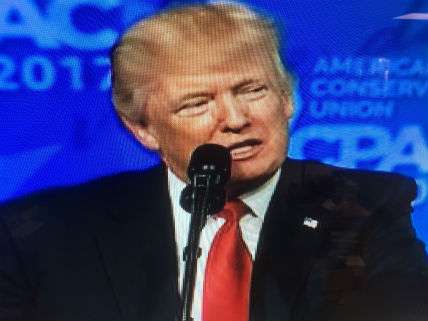Trump, Propaganda, and Credulity
How CPAC becomes TPAC.

A year makes quite a difference. During the run-up to 2016's Conservative Political Action Conference (CPAC), many activists on the right urged the American Conservative Union, which organizes the annual event, to rescind its invitation to Donald Trump. Allowing Trump to speak "will do lasting and huge (yuge!) damage to the reputations of CPAC, ACU, individual ACU board members, the conservative movement, and indeed the GOP and America," warned Republican strategist Liz Mair, who worked with the anti-Trump political action committee Make America Awesome. The candidate ultimately cancelled his long-planned speech, pointing to campaign events in Kansas and Florida as an excuse. There's a good chance he also wanted to avoid answering questions after his talk, not to mention the embarrassment of having hundreds of conservative activists stage a walkout.
Winning a presidential election certainly changes things. "By tomorrow this will be TPAC," Trump adviser Kellyanne Conway quipped yesterday. This morning Trump received a sustained standing ovation and chants of USA! USA! He told the CPAC crowd that "our victory was a win for conservative values."
As the rest of his nationalist address made clear, Trump is no more conservative now than he was before the election. Nevertheless, his support among Republican voters stands high, and Republican politicians are falling in line behind him because rank-and-file party members trust him more than they trust GOP congressional leaders. Clearly some citizens support Trump because they believe his "alternative facts" about crime rates and free trade and hope that his hodge-podge of anti-liberty promises will somehow "make America great again." But how to explain the surge in support among once-skeptical CPAC participants and other conservative voters in favor of Trump?
Perhaps because lots of conservatives are just acting as though they believe Trump's promises.
That's the explanation suggested by the Cornell political scientist Andrew Little in "Propaganda and Credulity," a paper just published in Games and Economic Behavior. "Politicians lie, and coerce others to lie on their behalf," argued Little. "These lies take many forms, from rewriting the history taught in schools, to preventing the media from reporting on policy failures, to relatively innocuous spinning of the economy's performance in press conferences." Little rather sanguinely observes that most people accept that lying plays a "central role in politics." This poses a game-theory problem: If audiences know that they are being lied to, why do politicians bother doing it?
Little's explanation: "Politicians lie because some people believe them." Little cites psychological experiments that show most people tend to believe what they are told even when they know the speaker has incentives to mislead them. In addition, empirical studies show that government propaganda actually works. "You can fool all the people some of the time and some of the people all the time, but you cannot fool all the people all the time," Abraham Lincoln purportedly said. Little has constructed a model that suggests that fooling some of the people can be enough to get most of the people acting like they are fooled.
"While those who believe whatever the government tells them are tautologically responsive to propaganda," notes Little, "their presence has powerful effects on the behavior of those who are aware that they are being lied to, as well as those doing the lying." Less credulous folks look around to gauge how their fellow citizens are responding to the politicians' claims, and then must decide how they will act. If those fellow citizens seem to believe the propaganda, then the less credulous might well conclude that it's not worth sticking their necks out to yell that the emperor is naked.
The upshot, Little says, is that "all can act as if they believe the government's lies even though most do not." One possibly hopeful additional result of Little's model: Leaders have a strong incentive to keep ratcheting up their lies even "to the point where it can become too ridiculous to be believed by anyone."
As Little acknowledges, this dynamic of snowballing credulity will be more prevalent in authoritarian countries where the risks of not following the party line are much higher. Few people want to be the only person in Red Square bearing a sign with the slogan "Down with Putin."
Still, Little thinks this dynamic might operate in party politics in the U.S. "In a more competitive partisan setting," he tells me, "one really wants to coordinate with people who are close to them, whether geographically, socially, or politically." More credulous party members accept the lies of the leaders, prompting the less credulous who want to maintain valuable social ties and advance their careers to act as though they too believe the party leaders' lies. Thus does CPAC become TPAC.


Show Comments (32)